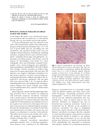 7 citations,
June 2010 in “Journal of The American Academy of Dermatology”
7 citations,
June 2010 in “Journal of The American Academy of Dermatology” Tranilast successfully treated a man's skin sarcoidosis when other treatments failed.
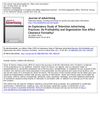 7 citations,
September 1991 in “Journal of Advertising”
7 citations,
September 1991 in “Journal of Advertising” More profitable TV stations have stricter ad approval rules, and bigger stations are generally stricter too.
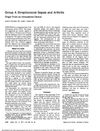 7 citations,
November 1977 in “JAMA”
7 citations,
November 1977 in “JAMA” A woman got a serious strep infection from an IUD, likely passed from her husband's infected throat during sexual activity.
 6 citations,
April 2021 in “Frontiers in Immunology”
6 citations,
April 2021 in “Frontiers in Immunology” A patient with lupus and long-term hair loss saw significant hair regrowth after using the drug tofacitinib.
 6 citations,
November 2023 in “Clinical Pharmacokinetics”
6 citations,
November 2023 in “Clinical Pharmacokinetics” Ritlecitinib shows promise as a versatile treatment for various autoimmune and inflammatory diseases.
 6 citations,
May 2023 in “Drugs”
6 citations,
May 2023 in “Drugs” Baricitinib helps regrow hair in adults with severe alopecia better than a placebo and is approved for treatment, but long-term effects are still unknown.
 6 citations,
January 2021 in “Journal of Cosmetic Dermatology”
6 citations,
January 2021 in “Journal of Cosmetic Dermatology” Poor sleep during the pandemic may increase stress and worsen hair loss conditions.
 6 citations,
June 2016 in “Experimental Dermatology”
6 citations,
June 2016 in “Experimental Dermatology” Frontal Fibrosing Alopecia is a poorly understood condition that is hard to treat and causes distressing hair loss.
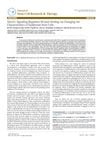 6 citations,
January 2016 in “Journal of Stem Cell Research & Therapy”
6 citations,
January 2016 in “Journal of Stem Cell Research & Therapy” Notch1 signaling is crucial for improving wound healing and skin regeneration by affecting stem cell behavior.
6 citations,
December 2013 in “Journal of Investigative Dermatology Symposium Proceedings” Alopecia areata involves complex immune and genetic factors, with potential treatment targets identified, but more research is needed.
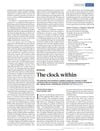 6 citations,
December 2011 in “Nature”
6 citations,
December 2011 in “Nature” The circadian clock in skin cells controls their growth and rest cycles.
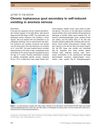 6 citations,
May 2010 in “The Journal of Dermatology”
6 citations,
May 2010 in “The Journal of Dermatology” A woman with anorexia developed gout from self-induced vomiting.
 6 citations,
March 1999 in “Seminars in Cutaneous Medicine and Surgery”
6 citations,
March 1999 in “Seminars in Cutaneous Medicine and Surgery” Scalp biopsies are essential for accurately diagnosing alopecia areata.
 5 citations,
October 2022 in “Frontiers in bioengineering and biotechnology”
5 citations,
October 2022 in “Frontiers in bioengineering and biotechnology” Ro stress hindered ginseng root growth and ginsenoside production, but increased certain hormones and affected gene regulation related to plant growth and stress responses.
 5 citations,
November 2004 in “Japanese journal of geriatrics”
5 citations,
November 2004 in “Japanese journal of geriatrics” Male hormones can cause hair loss, but treatments like Minoxidil and Finasteride can help, and targeting TGF-B1 could be a future solution.
 5 citations,
January 2022 in “Dermatology Reports”
5 citations,
January 2022 in “Dermatology Reports” Tofacitinib treatment for hair loss may worsen acne.
 5 citations,
January 2021 in “Inflammatory Bowel Diseases”
5 citations,
January 2021 in “Inflammatory Bowel Diseases” Tofacitinib improved ulcerative colitis, skin ulcers, and hair loss in a patient who didn't respond well to other treatments.
5 citations,
July 2020 in “Recent patents on inflammation & allergy drug discovery” Childhood Alopecia Areata causes hair loss and requires varied treatments, with psychological support being crucial.
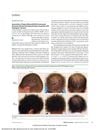 5 citations,
July 2020 in “JAMA Dermatology”
5 citations,
July 2020 in “JAMA Dermatology” Minoxidil solution applied twice daily improved hair growth in patients with Woolly Hair/Hypotrichosis due to LIPH gene issues, with mild side effects.
 5 citations,
June 2019 in “British Journal of Dermatology”
5 citations,
June 2019 in “British Journal of Dermatology” Tofacitinib was more effective than apremilast in treating hair loss in a mouse model of alopecia areata.
 5 citations,
March 2019 in “Dermatologic Clinics”
5 citations,
March 2019 in “Dermatologic Clinics” New treatments for hair loss show promise, but require more research on long-term effects and proper dosing.
 5 citations,
March 2016 in “Drug Development and Industrial Pharmacy”
5 citations,
March 2016 in “Drug Development and Industrial Pharmacy” New drug delivery systems improve treatment effectiveness and patient experience.
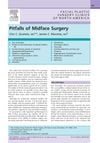 5 citations,
August 2005 in “Facial Plastic Surgery Clinics of North America”
5 citations,
August 2005 in “Facial Plastic Surgery Clinics of North America” Midface surgery complications are generally rare and manageable with skilled surgery and informed patients.
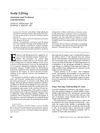 5 citations,
September 1994 in “The Journal of Dermatologic Surgery and Oncology”
5 citations,
September 1994 in “The Journal of Dermatologic Surgery and Oncology” Scalp lifting surgery can safely and effectively reduce baldness if done with careful planning and proper technique.
 4 citations,
November 2023 in “Frontiers in immunology”
4 citations,
November 2023 in “Frontiers in immunology” New treatments targeting T-cell pathways are needed for better alopecia areata management.
 4 citations,
January 2023 in “The journal of allergy and clinical immunology/Journal of allergy and clinical immunology/The journal of allergy and clinical immunology”
4 citations,
January 2023 in “The journal of allergy and clinical immunology/Journal of allergy and clinical immunology/The journal of allergy and clinical immunology” Biologics, especially Dupilumab, are effective and safe for treating severe childhood eczema.
 4 citations,
September 2022 in “Journal of The American Academy of Dermatology”
4 citations,
September 2022 in “Journal of The American Academy of Dermatology” Baricitinib was effective in regrowing hair in patients with different levels of alopecia areata severity.
 4 citations,
January 2022 in “Dermatologic Therapy”
4 citations,
January 2022 in “Dermatologic Therapy” Tofacitinib was found to be a safe and effective treatment for hair regrowth in patients with alopecia areata.
 4 citations,
May 2019 in “Sultan Qaboos University Medical Journal”
4 citations,
May 2019 in “Sultan Qaboos University Medical Journal” Tofacitinib helped regrow hair in a patient with severe hair loss and improved their quality of life without side effects.
 4 citations,
April 2019 in “Cell Stem Cell”
4 citations,
April 2019 in “Cell Stem Cell” Certain immune cells in the skin can stop hair from growing.




























